Smart City and Innovations
Peachtree Corners’ Prosperity Hinges on Technology
Published
2 years agoon
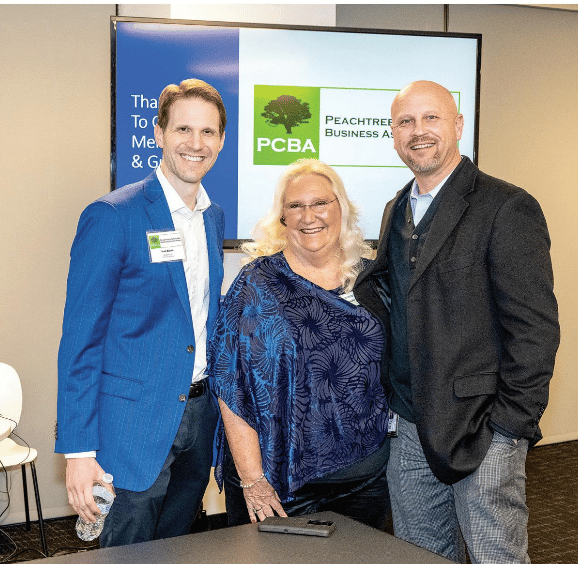
Curiosity Lab and the innovation it attracts may be the most significant economic driver in the area.
In Peachtree Corners, where economic development and business endeavors are in constant change, it’s important to get periodic updates on what’s going on in city government. That’s why the Peachtree Corners Business Association (PCBA) invited Peachtree Corners City Manager Brian Johnson as the evening’s speaker at its January Business After Hours event.
Johnson prefaced his talk by pointing out that PCBA is the same age as the city itself and that government isn’t the only driver in a municipality’s prosperity.
“Cities are only as good as the activity, the involvement that we get in all facets of the city, whether it’s the business environment, recreational, whatever — and we can’t do it without people like you who are taking your time to try to make your community a better place,” he said.
Through that kind of community and business support, Peachtree Corners remains the second largest municipality in Georgia with no city property tax, Johnson added.
“One of the reasons that we can do that is because of our very healthy business environment and the synergy that it generates,” he said. “And the more successful the companies here are, the more revenue we get from lots of different things.”
Johnson cited occupational tax, business license fees, and sales tax from people shopping, eating, and lodging in the city as big contributors. “It’s one of the main reasons that we can do it,” he explained. “So, the city is very bullish on economic development.”
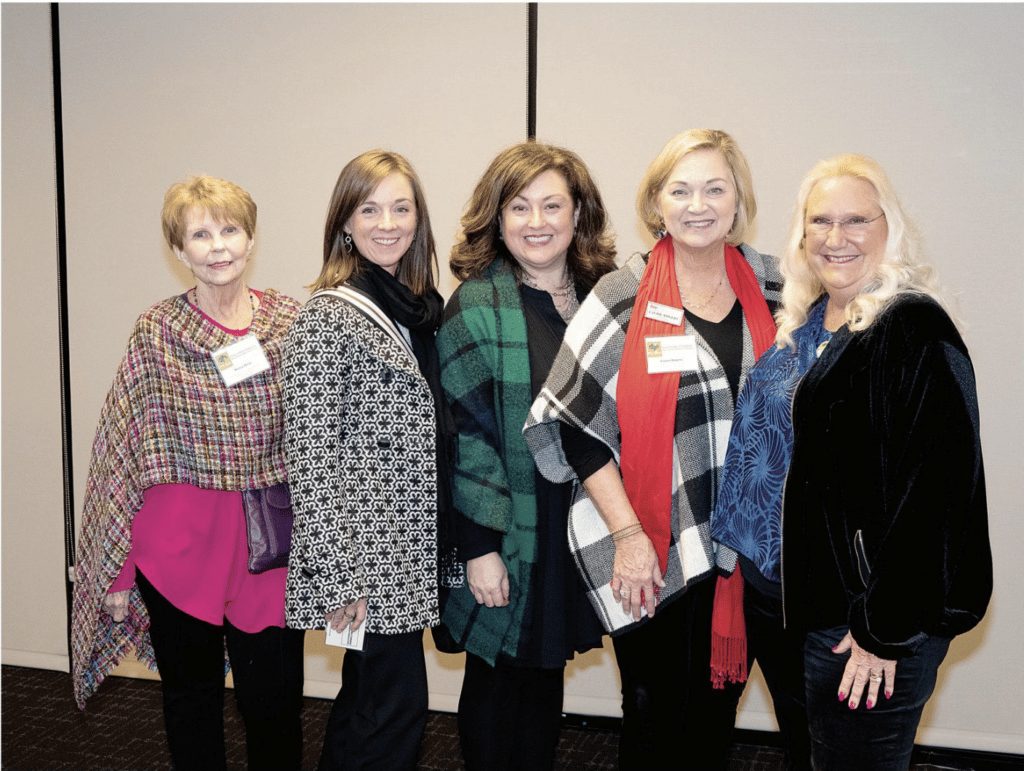
City’s appeal
Peachtree Corners’ appeal has lured many from far and wide. Part of the interest in the city comes through Curiosity Lab, which is a very important asset as it has become a magnet for business activity coming to the city.
“Four years ago, we sat down and really looked hard at the city and said, ‘Economic development activity is important so that we don’t have to collect property tax, but are we doing everything we can to make sure that this community stands out from other communities?’” Johnson remembered.
Peachtree Corners is in a very competitive market when it comes to attracting and retaining businesses. Johns Creek, Dunwoody, Brookhaven, Alpharetta are all in the running when companies look to expand or relocate. The city kept coming back to the same conclusion to attract tech industries.
Vision continues expanding
“Back in the late 60s, a Georgia Tech grad turned developer named Paul Duke decided to do something about what, at the time, was a brain drain of Georgia Tech graduates having to leave metro Atlanta because there were not enough tech jobs in the area to keep them,” said Johnson.
Duke had been to the Research Triangle Park area in North Carolina and seen a concept of building office parks under a theme. The occupants of those office buildings were all together and all focused on the same industry — biomedical, energy, etc.
Inspired by that idea, Duke started speculatively constructing office buildings about 20 miles from downtown Atlanta and only filling them with tech companies. Today, it has grown into Technology Park, covering more than 500 acres and filled with over 10,000 people.
Over the years, some amazing discoveries have been made in that space.
- In April of 1977, the first PC modem was created by a Georgia Tech alumnus.
- The color printer was invented in Technology Park.
- Scientific Atlanta, now Cisco, was also founded there.
Moving forward, the city couldn’t just rely on its reputation. Similar technology-themed business parks were cropping up in other areas of metro Atlanta — Johns Creek, Buckhead, and downtown near Georgia Tech — as well as in other states.
City leaders started looking at what they could offer technology companies that they couldn’t get everywhere else. “We noticed that technology goes through an evolution in which brand-new technological gadgets or widgets are created. The first place that it gets tested is in a closed laboratory environment,” Johnson said.
Once it’s ‘perfected’ in the lab, it needs an intermediate step before it’s released to the general public. For example, an advanced vehicle would be tested on a closed course without people and other vehicles around. Once it passes that level, it needs another step before it’s completely ready — limited interaction with the ‘real world.’
“Maybe we take all of those roads that the city owns inside of Technology Park, and we open it up to companies to test or demonstrate the technology of any sort,” said Johnson.
The city investigated and found that nowhere else in the world had this. “So, we set out in creating Curiosity Lab,” he said. Its three-mile stretch of roadway offers 32 places where new technology can interact with cars and everything else involved in day-to-day traffic.
Major economic driver
The city isn’t only looking to attract automobile technology. Four years ago, it partnered with Sprint, now T-Mobile, to set up a 5G deployment — one of the first in metro Atlanta.
“This has become a very powerful magnet for companies to come here, even if it’s just for a little while. When we created it, …we decided to reduce some of the barriers to entry, and one of them is money,” said Johnson.
There is no cost to use the facilities, but the companies spend money in hotels, restaurants, retail shops, and other local businesses while they’re here. So, Curiosity Lab is now an economic driver for the city and the entire area.
Once companies see the possibilities, some decide to move their operations here. One such company is Brightree, a technology company that provides solutions to post-acute care providers. It was looking to relocate and ultimately chose Peachtree Corners.
“The tipping point was that the ecosystem we created was going to afford them an opportunity to interact with companies, or even use some of the technology, here that they wouldn’t have had elsewhere,” said Johnson.
The company took over a vacant building and brought in about 150 employees initially.
Another success story is Intuitive Surgical, a California-based company that makes robotic-assisted surgical systems. The most notable right now is called DaVinci. The company is looking to expand aggressively because it’s the only one with FDA approval for this type of device.
Intuitive was looking for east coast operations and had narrowed its selection to Peachtree Corners or Durham, NC.
“What pushed them over the edge was Curiosity Lab’s ecosystem in Tech Park,” said Johnson. “They said the partners and users we have are what they want to be around and be able to interact with.”
Intuitive is currently building a $600 million medical campus, creating 1,500 jobs with an average salary of $150,000. It will also bring 19,000 overnight hotel room stays per year from visiting surgeons who come here for training on the DaVinci device. It’s the largest economic development project in Gwinnett County and the second-largest medical economic development project in Georgia.
Johnson added that the vision of city leaders has afforded Peachtree Corners residents to enjoy an outstanding quality of life with no city property tax, thanks to Curiosity Lab. He hinted that other big announcements will be made in the coming months and encouraged everyone to enjoy the ride.
Photos by Richard Phillips
Related
Arlinda Smith Broady is part of the Boomerang Generation of Blacks that moved back to the South after their ancestors moved North. With approximately three decades of journalism experience (she doesn't look it), she's worked in tiny, minority-based newsrooms to major metropolitans. At every endeavor she brings professionalism, passion, pluck, and the desire to spread the news to the people.

Education
GA Tech, Peachtree Corners Solidify Partnership with First-of-its-Kind Venue
Published
2 weeks agoon
April 22, 2025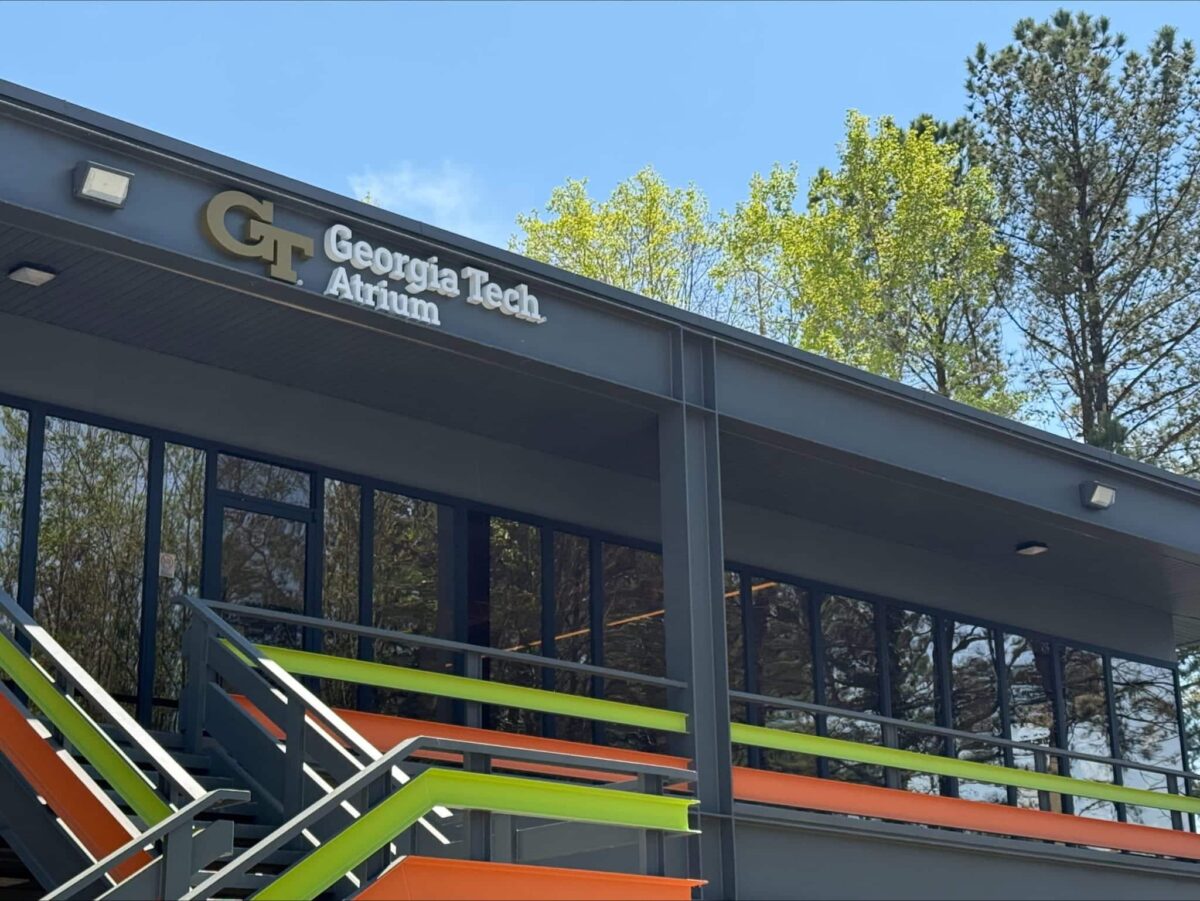
The fortunate 200 or so attendees of the opening of the Georgia Tech Atrium at Curiosity Lab in Peachtree Corners can say they witnessed a significant bit of history. The ceremony highlighted a decade-long partnership between the Georgia Institute of Technology and the city of Peachtree Corners and introduced one of the university’s new global initiatives.
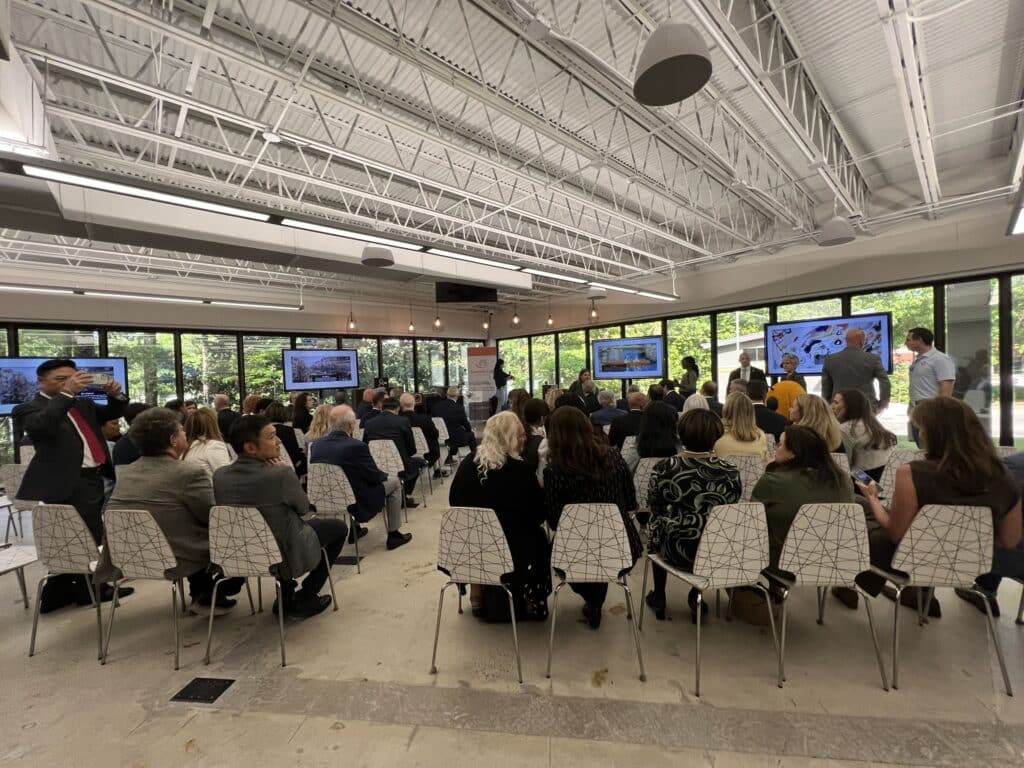
Led by the Center for 21st Century Universities at the Georgia Tech College of Lifetime Learning, each GT Atrium will offer a space for the institute’s faculty, staff, students, alumni and partners to advance their academic and professional interests in the country or region that it serves.
Designed to foster hands-on student research, industry collaboration and technology breakthroughs, they will provide tailored programs, event space, a study abroad base, co-working and co-learning spaces and opportunities to engage and associate with Georgia Tech.
The opening of the GT Atrium in Peachtree Corners is the first of many planned collaborations to come between the school and municipalities throughout the state.
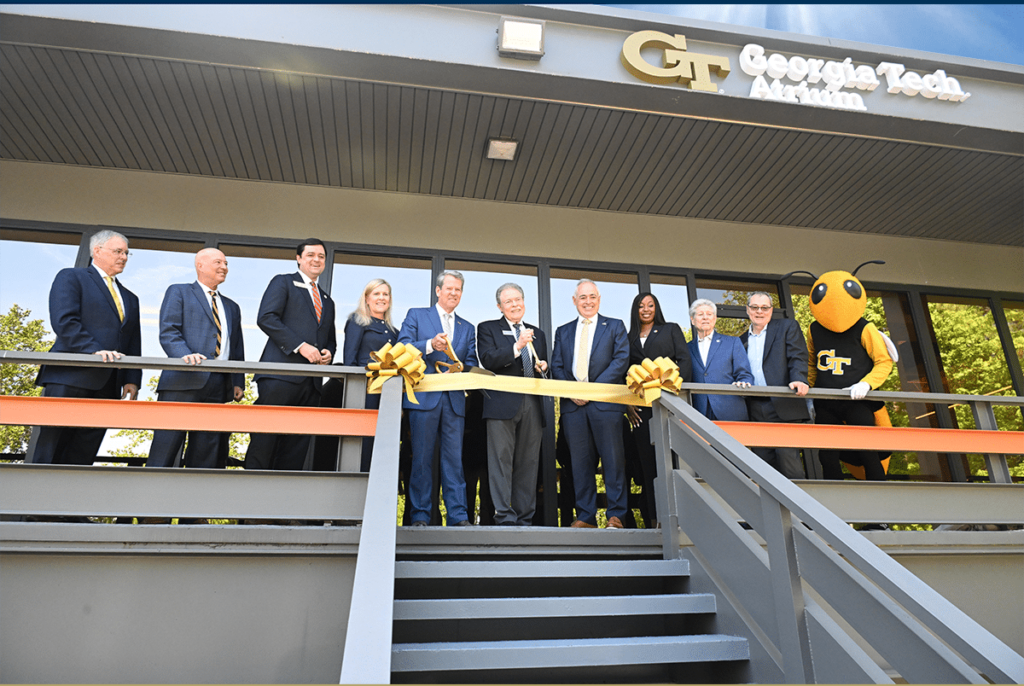
“The Georgia Tech Atrium at Curiosity Lab represents the future of higher education — where learning extends beyond the classroom and where broad community collaboration creates novel opportunities and advances,” said Georgia Tech President Ángel Cabrera.
“This initiative proceeds from a concerted strategy to extend Georgia Tech’s reach, expand access to our resources and expertise and build connections that benefit students and advance research. We’re proud to partner with the City of Peachtree Corners to bring this vision to life.”
Key points
Key points of the event included the Atrium’s role in fostering innovation, upskilling and community engagement. Through this and other initiatives, Georgia Tech aims to double its degree awards and enhance its research impact.
The atrium will offer professional education, K-12 programs and networking opportunities.
The project aligns with the state’s economic development goals, having created 193,000 jobs and $90 billion in investments since 2019.
The event concluded with a ribbon-cutting ceremony, emphasizing the significance of the Atrium in Georgia’s innovation ecosystem.
A collaborative project
With Gov. Brian Kemp, his wife Marty Kemp, Peachtree Corners Mayor Mike Mason, Ga Tech President Ángel Cabrera, Georgia state Rep. Scott Hilton-R, Peachtree Corners and many other politicians and dignitaries present, Gov. Kemp made a point of thanking local Georgia Department of Economic Development board member Jose Perez for his hand in bringing the project together.
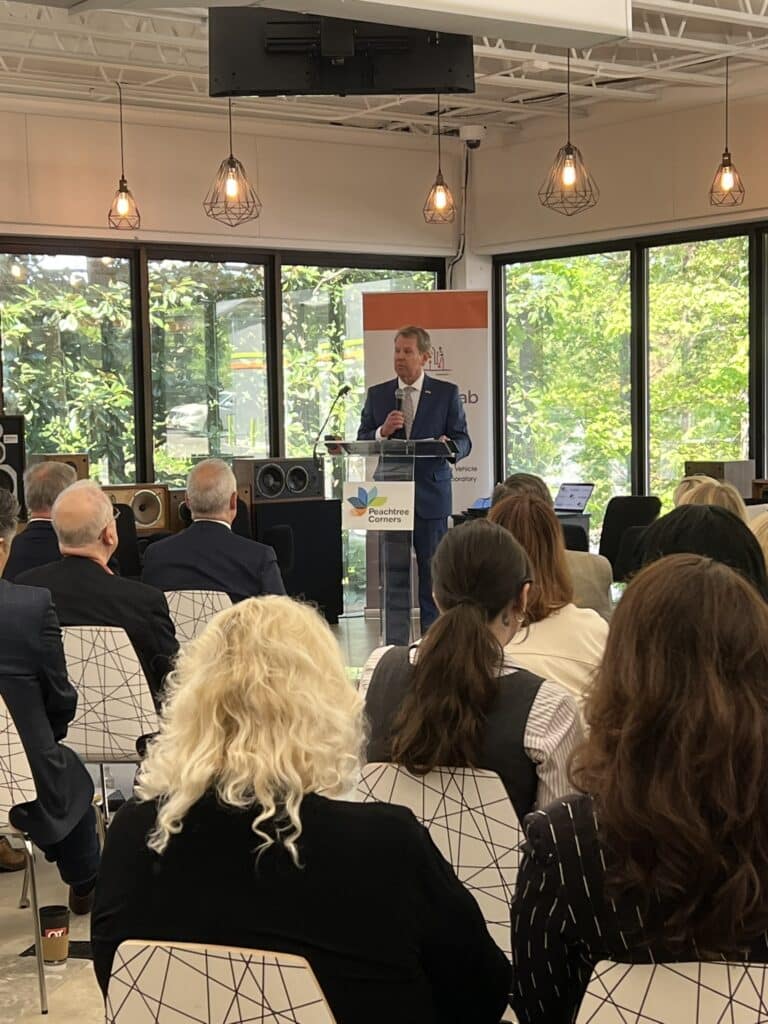
“And I just want to thank Jose Perez — you’re a great champion,” he said. “We appreciate your leadership and your friendship. You know this pro-business environment that we have is essential to Georgia’s success, and it’s why we’ve been named the number one state in the country for business for 11 consecutive years.”
A resident of Peachtree Corners, Perez is the retired President of Target Market Trends, Inc. (TMT), a consulting firm he founded in 2002 to help clients develop market strategies. He also spent 25 years at BellSouth in various management roles and worked as an international consultant with Gartner, Inc.
From 2004 to 2011, he served on the Board of Education and held leadership positions with the National Association of State Boards of Education and the State Charter School Commission.
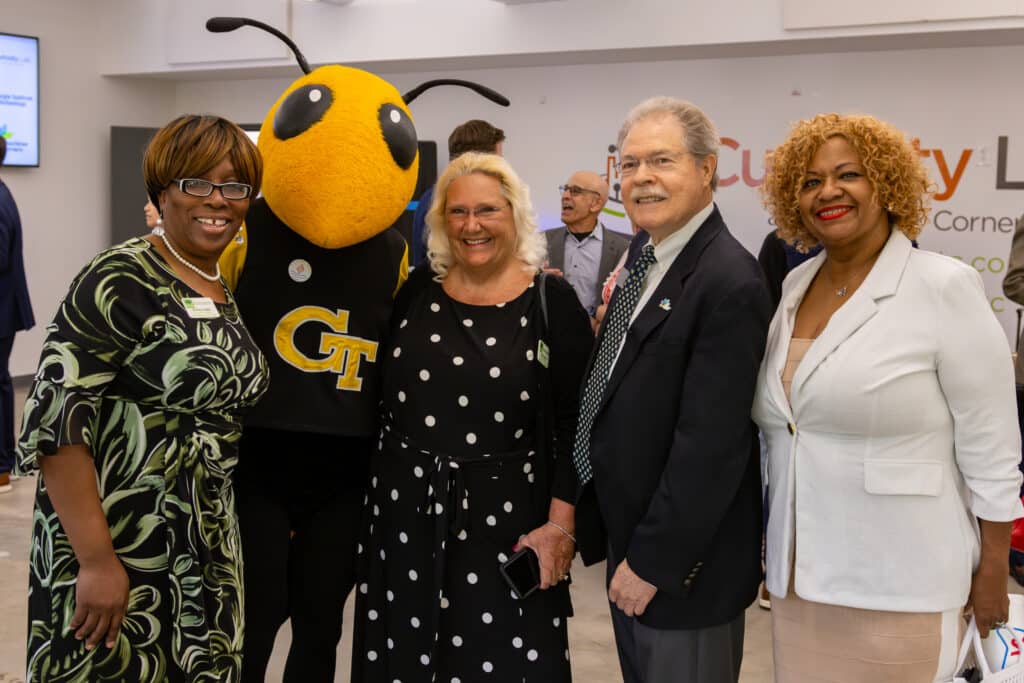
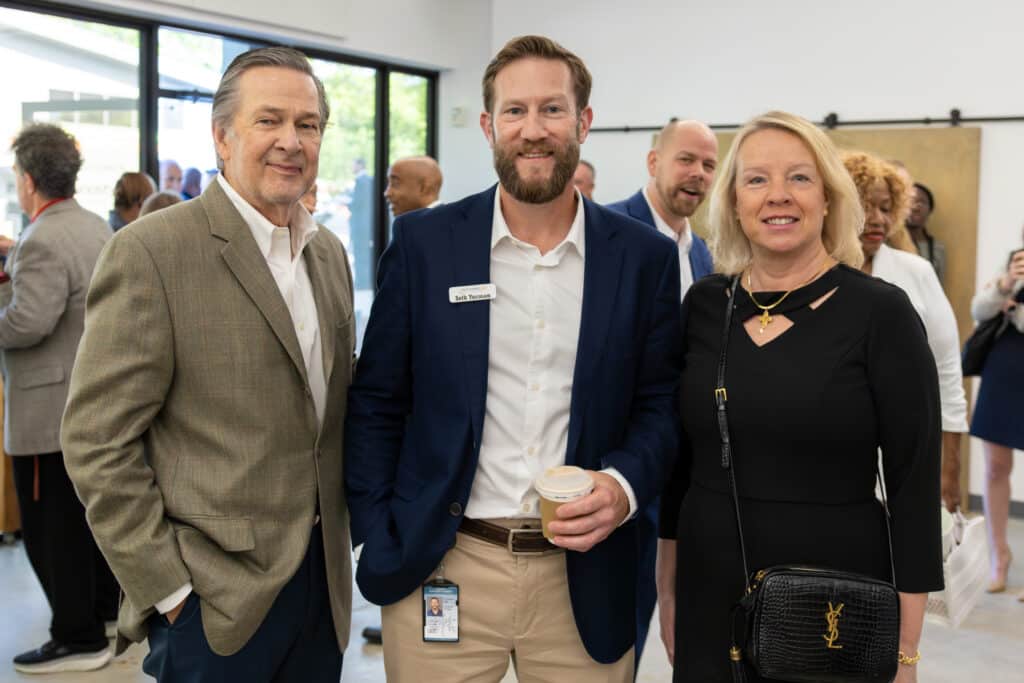
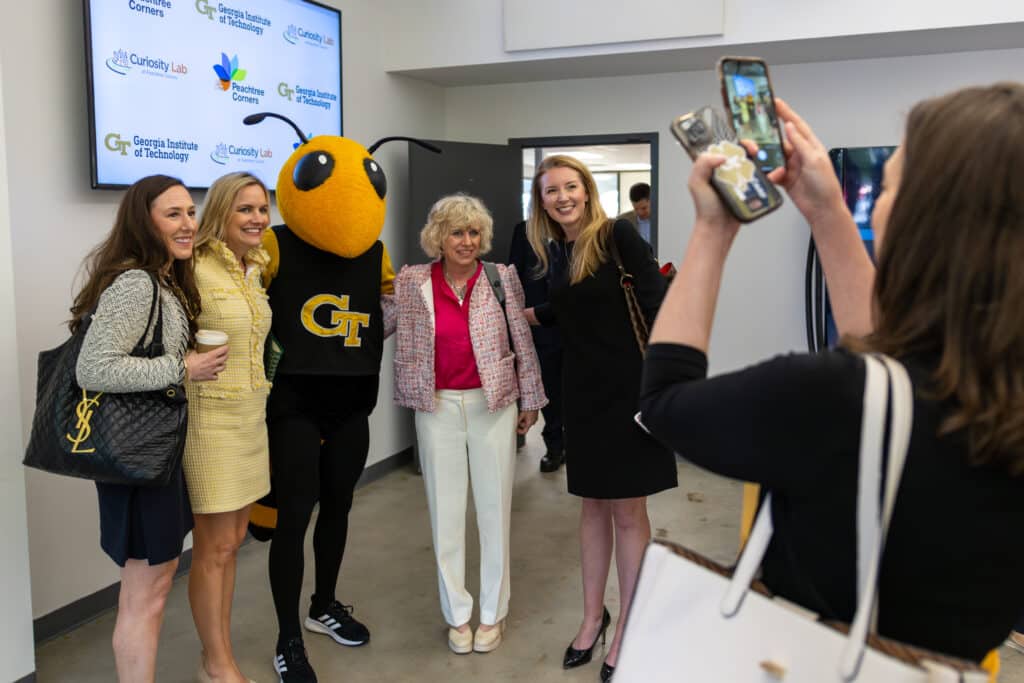
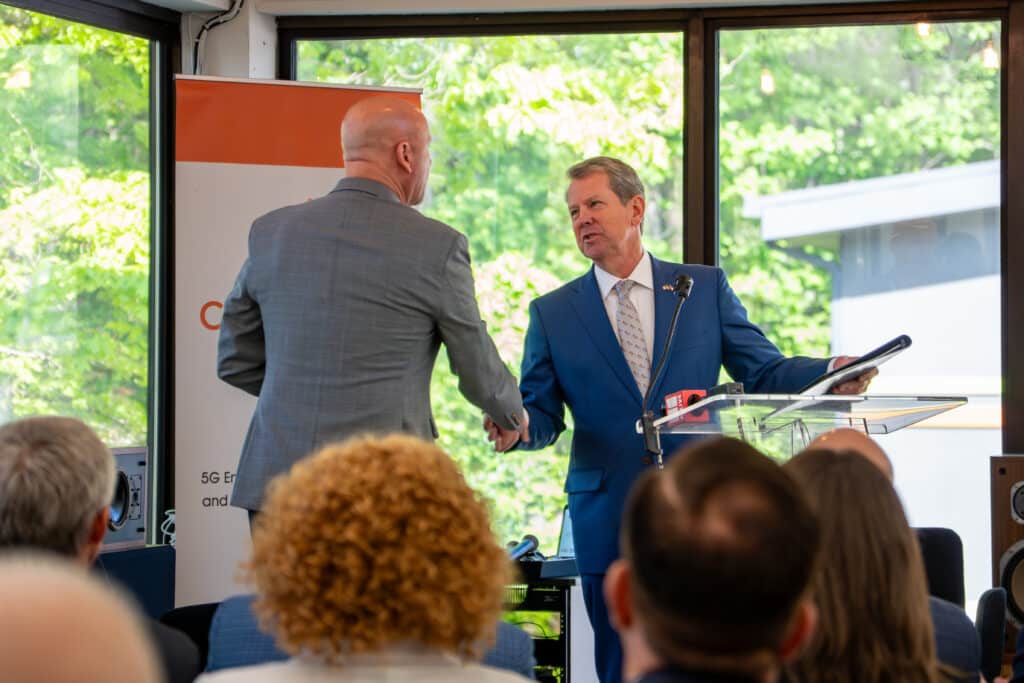
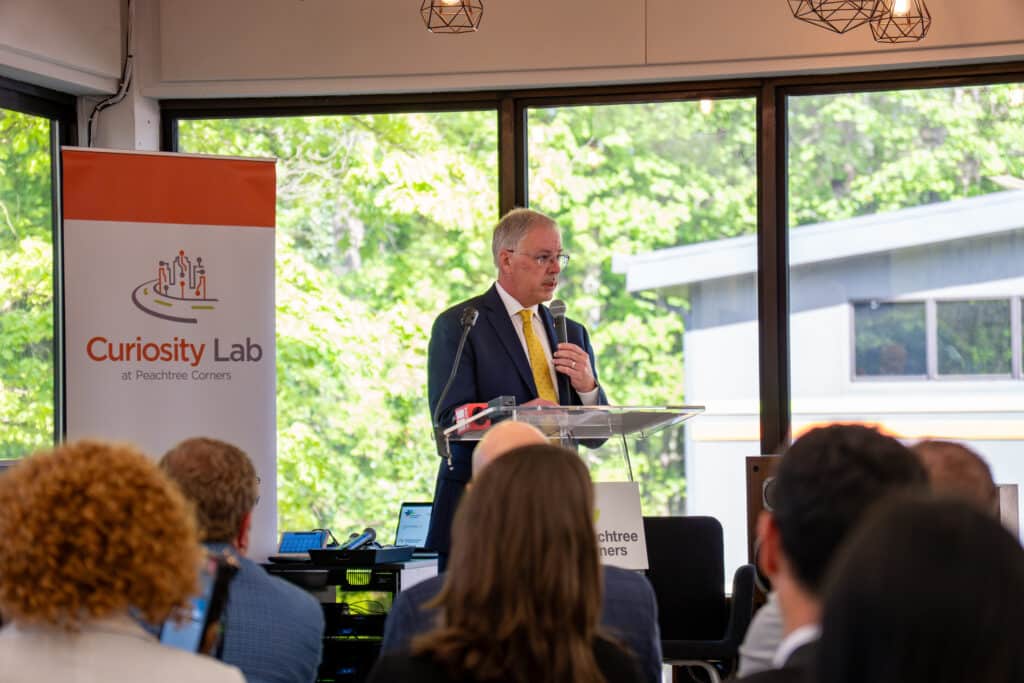
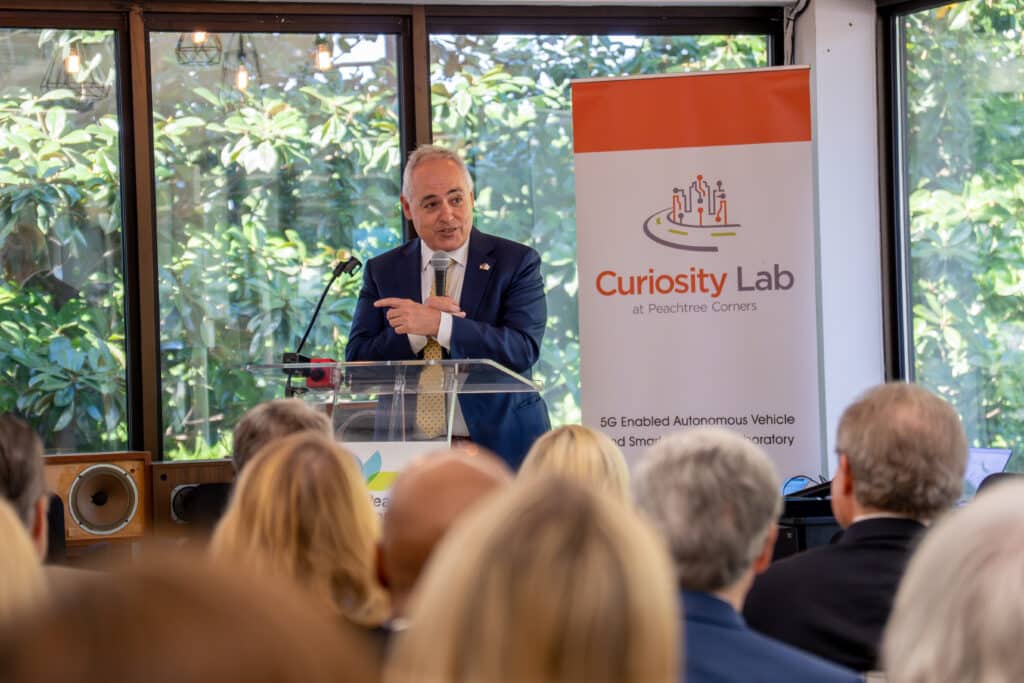
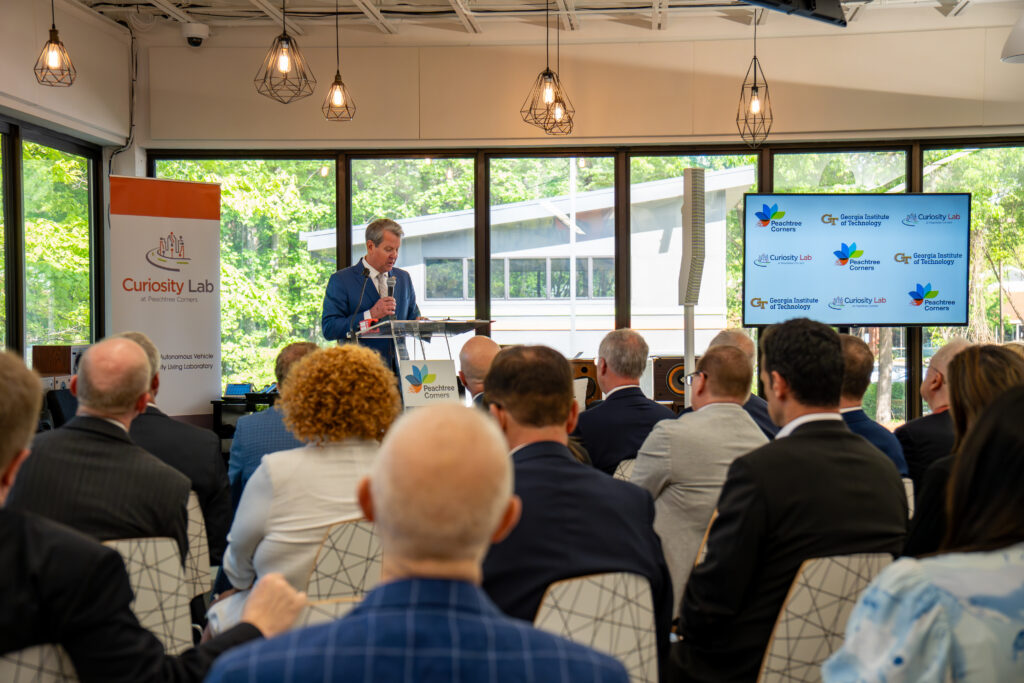
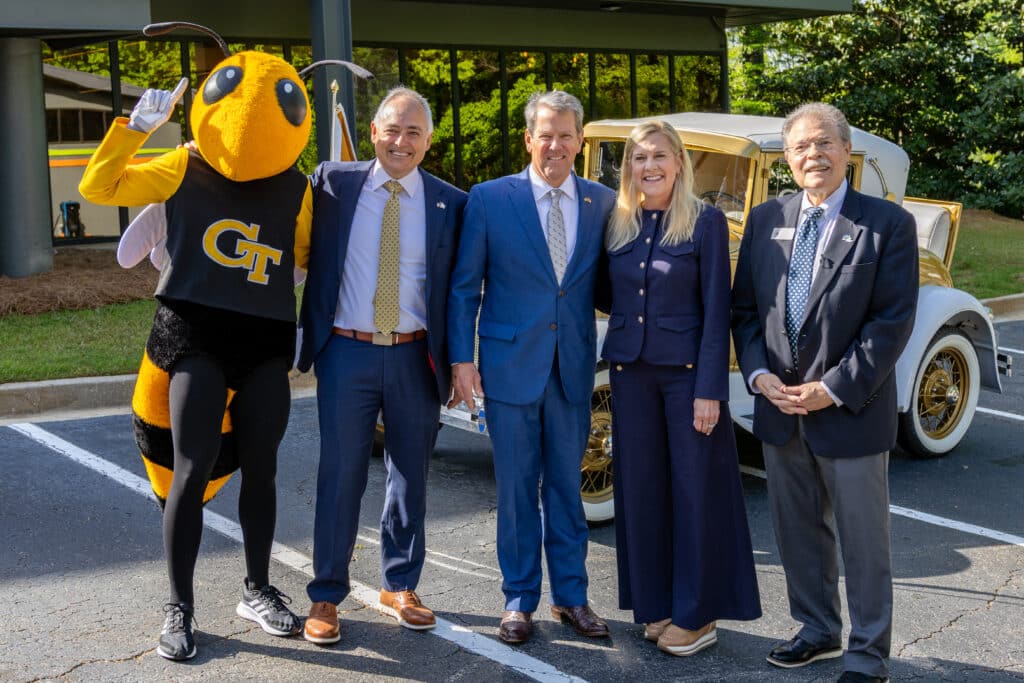
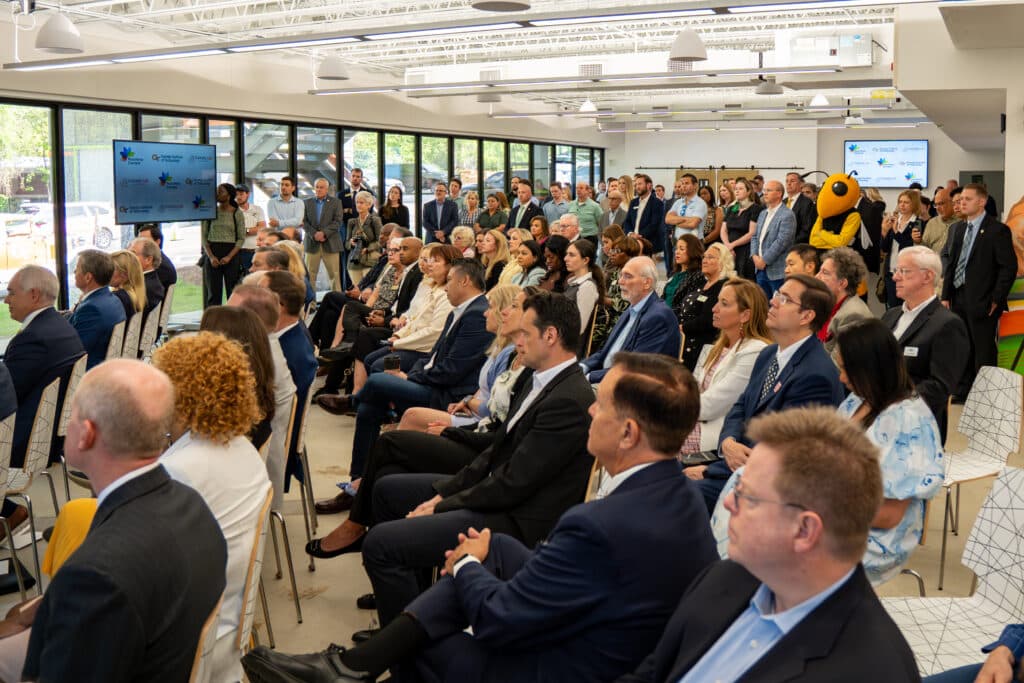
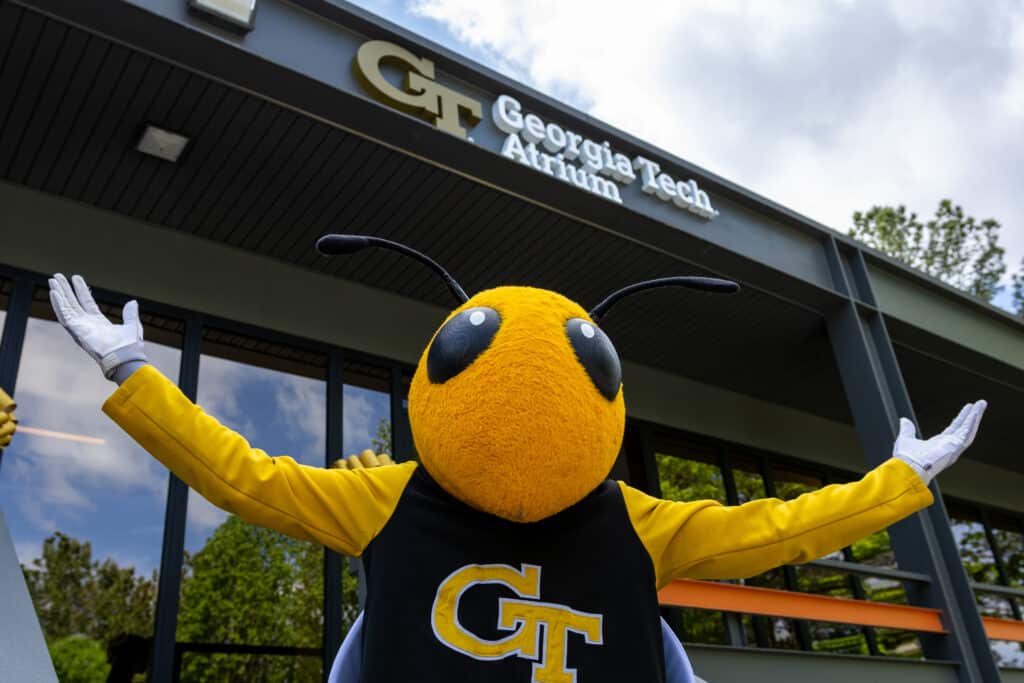
About Georgia Tech
The Georgia Institute of Technology, or Georgia Tech, is one of the top public research universities in the U.S., developing leaders who advance technology and improve the human condition.
The institute offers business, computing, design, engineering, liberal arts and sciences degrees, as well as professional development and K-12 programs for fostering success at every stage of life.
Its more than 53,000 undergraduate and graduate students represent 54 U.S. states and territories and more than 143 countries. They study at the main campus in Atlanta, at instructional sites around the world and through distance and online learning.
As a leading technological university, Georgia Tech is an engine of economic development for Georgia, the Southeast and the nation, conducting more than $1 billion in research annually for government, industry and society.
For more about the GT Atrium at Peachtree Corners, visit atrium.gatech.edu/peachtree-corners.
Gallery photos of the event courtesy of Curiosity Lab
Related
Smart City and Innovations
Opsys Collaborates with Curiosity Lab and City of Peachtree Corners to Launch Solid-State LiDAR Technology
Published
6 months agoon
November 11, 2024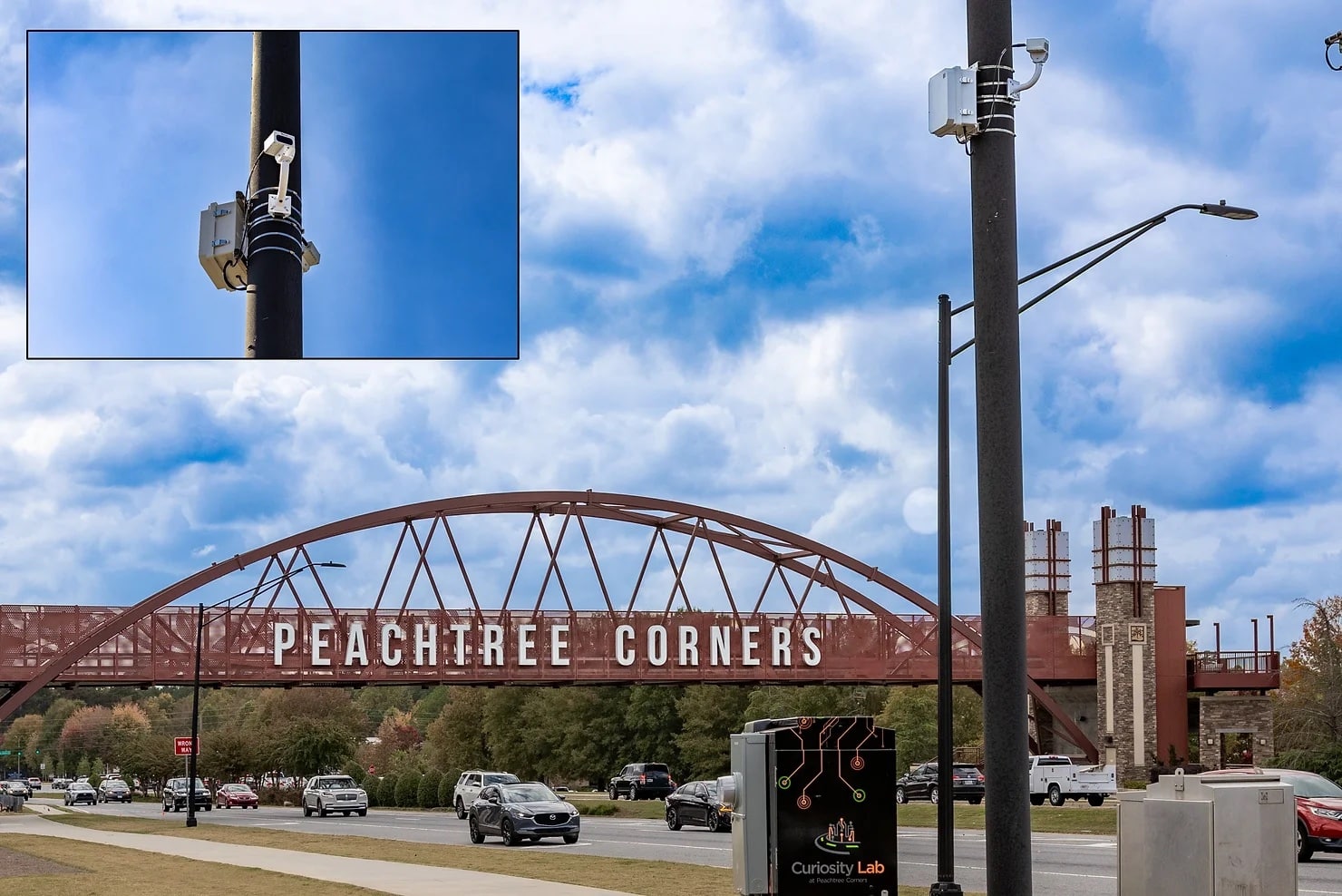
Curiosity Lab and Opsys showcased the technology live at Smart City Expo World Congress in Barcelona
The City of Peachtree Corners — one of the nation’s first smart cities powered by real-world connected infrastructure and 5G — recently collaborated with Opsys, developer of the world’s most advanced pure solid-state scanning LiDAR sensor, to launch and deploy the company’s Advanced LiDAR Technology Opsys Sensors (ALTOS) Gen 2 LiDAR at Curiosity Lab.
This marks Opsys’ first real-world deployment of the ALTOS, the company’s first deployment with a municipality and the company’s first deployment in the United States.
The ALTOS Gen 2
As a pure solid-state LiDAR, the ALTOS Gen 2 has no moving parts, enabling best-in-class performance with high resolution and extreme reliability with a 4D point cloud from the device’s specific field of view.
The pure-solid state characteristics make the unit more robust, avoiding mechanical failures associated with moving components and allowing the unit to have 24/7 operation and pass a 50g shock and full vibration test. The ALTOS Gen 2 brings a simple, customizable design to market that can be used for different applications and unique shapes with a low-power consumption, without sacrificing performance.
“The ALTOS Gen 2 represents the future of smart city technology,” said Rafi Harel, chief executive officer of Opsys. “This collaboration with Peachtree Corners and Curiosity Lab gives us the unique opportunity to showcase the reliability and efficiency of our pure solid-state LiDAR technology in a real-world environment, which will soon improve safety and traffic management for cities across the globe.”
“As our first real-world deployment and first U.S. deployment, we are looking forward to working with Peachtree Corners as our test and demo site to then launch into the U.S. market,” he continued.
Flexible design and cutting-edge technology
Opsys’ new technology boasts a higher partial differential equation (PDE) and a larger array than other models, which gives the unit improved detection range and a higher resolution of objects. The improved optics reduce unwanted light, while improving uniformity and enhancing illumination. In addition, the unit’s optimized ASIC/processor allows for advanced processing of data, as well as lower power dissipation and cost.
“Opsys’ technology was extremely easy to calibrate and deploy in our city,” said Brandon Branham, executive director of Curiosity Lab. “The simple, yet flexible design made it easy for set up, without the need of special custom cables or proprietary connectors. The device behaves like a normal network device which also made it easy for us to integrate into our single-pane-of-glass, smart city management systems.”
“By adding this cutting-edge technology into our infrastructure, we’re able to enhance safety and operational efficiency for our community while showcasing scalable solutions that other cities and industries can easily adopt,” Branham added.
Location and Details
The ALTOS Gen 2 LiDAR units are deployed in the City of Peachtree Corners at the intersection of SR 141 and Town Center Boulevard. Here, the ALTOS Gen 2 units provide precise, real-time data on traffic flow and pedestrian movements, offering significant enhancements to urban safety and traffic management.
Its ability to operate continuously while supporting PoE (power over ethernet) and auxiliary power make it adaptable for different municipal implementations and ideal for use across various industries including intelligent traffic systems (ITS), smart factories, robotics and public safety applications such as perimeter security and healthcare.
Smart City Expo World Congress, Barcelona
Opsys debuted the technology at the Smart City Expo World Congress in Barcelona November 5-7 in the Curiosity Lab booth. This included a demo with live LiDAR feed from the Peachtree Corners intersection. Representatives of Curiosity Lab and Opsys were also available for interviews at Booth D40 Hall 3 in the USA Pavilion.
For more information about Opsys, visit opsys-tech.com.
For more about the City of Peachtree Corners, visit peachtreecornersga.gov.
To learn more about Curiosity Lab, visit curiositylabptc.com.
Related
Smart City and Innovations
International Leaders Gather for 10th Annual SMART Community Exchange 2023 in Peachtree Corners
Published
2 years agoon
October 27, 2023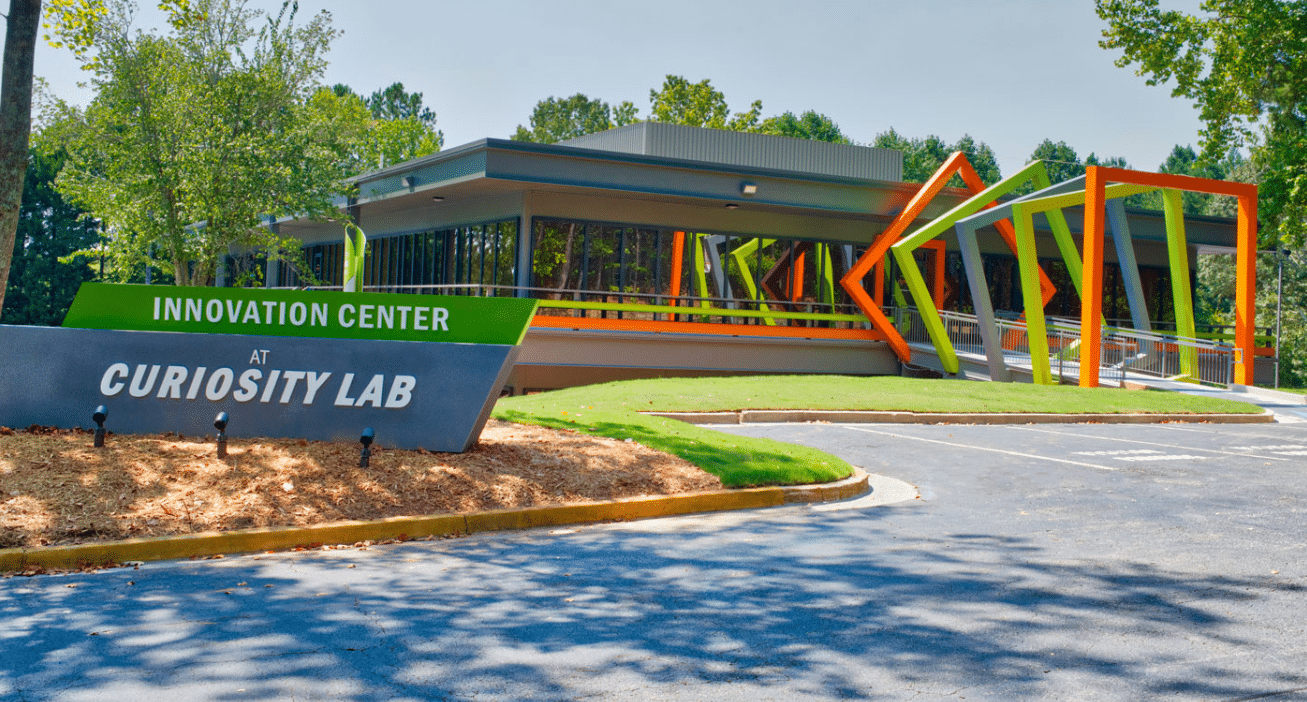
SMART Community Council has hosted SMART Community Exchanges across the U.S. and Europe during the past decade, engaging executives, investors, innovators and advisors in hot spots of technology innovation.
Strong technology cooperation and the initiative to make communities smarter get support on both sides of the Atlantic. Leaders face the same challenges and see partnership opportunities to test, prove, commercialize and implement SMART solutions.
The 10th Annual SMART Community Exchange brings together SMART leaders, entrepreneurs, technologists, innovators and investors. The event will take place on Monday, October 30, from 9 a.m. to 5 p.m. at the Curiosity Lab in Peachtree Corners.
The focus is on SMART-R (SMART + Resilient) Infrastructure, energy, mobility, transportation, frontier technologies, safety and security, health and wellness, education, finance and more.
Participants include delegates from enterprises and organizations, higher education institutions, federal, state, and local governments, economic development, industry, manufacturers, labor organizations and workforce development.
“There is so much potential for companies to grow business through strategic partnerships in the hot spots of tech innovation across the United States. Many of these ‘hot spots’ are SMART Communities, such as Peachtree Corners, Georgia, and the Curiosity Lab, co-host of the SMART Community Exchange 2023,” said Tana Torrano, co-founder of the SMART Community Exchange.
Curiosity Lab at Peachtree Corners is a 5G-enabled intelligent mobility and smart city living laboratory near Atlanta.
Designed as a proving ground for IoT, mobility and smart city emerging technologies, the lab’s centerpiece is a three-mile public autonomous vehicle roadway leveraging cellular vehicle-to-everything (C-V2X) technologies.
The ecosystem’s infrastructure includes intelligent traffic cameras and signals, smart streetlights, the country’s first “IoT Central Control Room” implemented in a city and a 25,000-square-foot innovation center.
The Curiosity Lab, owned and operated by the City of Peachtree Corners, is one of North America’s only real-world testing environments.
SMART technology broadens access to new opportunities and markets in tech-intensive economies and benefits communities, businesses, governments and citizens on both sides of the Atlantic.
“US-EU cooperation matters today more than ever. We share the same values and commitment to serve as a catalyst for joint innovation. … Together, we are stronger to face today’s challenges and reap the benefits in a fast-changing world where technology plays a critical role,” stated Minna LeVine, Chair of the SMART Community Council.
Interested in attending? Register here! Registration is $97 per person and includes lunch, programming, VIP networking and a tour of Curiosity Lab.
Related
Read the Digital Edition
Subscribe
Keep Up With Peachtree Corners News
Join our mailing list to receive the latest news and updates from our team.
You have Successfully Subscribed!

Peachtree Corners City Guide 2025: Spring/Summer Digital Edition

Two Peachtree Corners Business Leaders Named Finalists for EY Entrepreneur Award

GA Tech Launches First-of-its-Kind GT Atrium in Peachtree Corners

Katherine Lafourcade — A Journey of Passion, Resilience and Giving Back

PCBA Announces 2025 Scholarship Winner

Digital Edition

Paul Duke STEM High School Student Earns CGO Scholarship

World Blood Donor Day Starts Here: Theo’s Miracle, Katherine’s Mission [Podcast]

Peachtree Corners Grows Business Opportunities Through Economic Development

Digital Edition

World Blood Donor Day Starts Here: Theo’s Miracle, Katherine’s Mission [Podcast]

Paul Duke STEM High School Student Earns CGO Scholarship

PCBA Announces 2025 Scholarship Winner

Katherine Lafourcade — A Journey of Passion, Resilience and Giving Back

GA Tech Launches First-of-its-Kind GT Atrium in Peachtree Corners

Peachtree Corners City Guide 2025: Spring/Summer Digital Edition

Light up the Corners [Video]

Capitalist Sage: Business Leadership in Your Community [Podcast]

Cliff Bramble: A Culinary Adventure through Italy

Top 10 Brunch Places in Gwinnett County

A Hunger for Hospitality

THE CORNERS EPISODE 3 – BLAXICAN PART 1

Top 10 Indoor Things To Do This Winter

The ED Hour: What it takes to Remove Barriers from Education

Peachtree Corners Life
Topics and Categories
Trending
-
Digital Edition2 days ago
Digital Edition
-
Education4 days ago
Paul Duke STEM High School Student Earns CGO Scholarship
-
Podcast2 days ago
World Blood Donor Day Starts Here: Theo’s Miracle, Katherine’s Mission [Podcast]
-
Business2 hours ago
Peachtree Corners Grows Business Opportunities Through Economic Development






